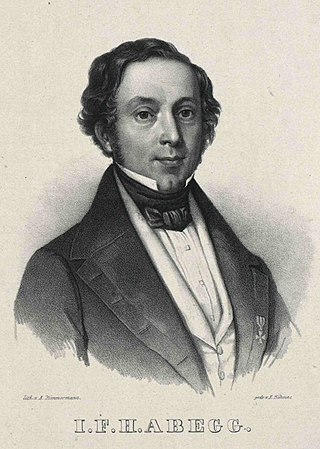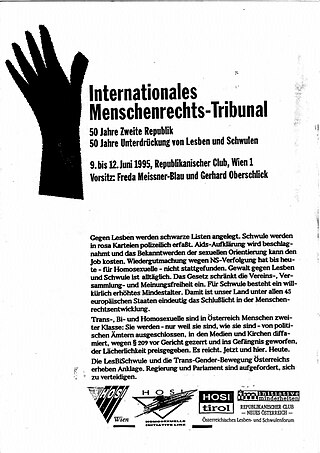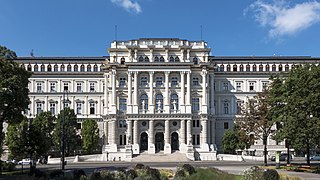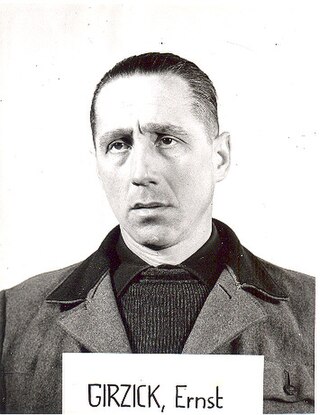Nulla poena sine lege is a legal principle which states that one cannot be punished for doing something that is not prohibited by law. This principle is accepted and codified in modern democratic states as a basic requirement of the rule of law. It has been described as "one of the most 'widely held value-judgement[s] in the entire history of human thought'".
Anton "Toni" Burger was a Hauptsturmführer (Captain) in the German Nazi SS, Judenreferent in Greece (1944) and Lagerkommandant of Theresienstadt concentration camp.

Julius Friedrich Heinrich Abegg was a German criminalist.
Friedrich Peter was an Austrian politician who served as chairman of the Freedom Party of Austria from 1958 to 1978. He was an active Nazi between 1938 and 1946.

Heinrich Maier was an Austrian Roman Catholic priest, pedagogue, philosopher and a member of the Austrian resistance, who was executed as the last victim of Hitler's régime in Vienna.
The Verbotsgesetz 1947, abbreviated VerbotsG, is an Austrian constitutional law originally passed on 8 May 1945 and amended multiple times, most significantly in February 1947 and in 1992. It banned the Nazi Party and its subsidiaries and required former party members to register with local authorities. Individuals were also subject to criminal sanctions and banned from employment in positions of power.

The judiciary of Austria is the system of courts, prosecution and correction of the Republic of Austria as well as the branch of government responsible for upholding the rule of law and administering justice. The judiciary is independent of the other two branches of government and is committed to guaranteeing fair trials and equality before the law. It has broad and effective powers of judicial review.

Jörg Haider was an Austrian politician. He was Governor of Carinthia on two occasions, the long-time leader of the Freedom Party of Austria (FPÖ) and later Chairman of the Alliance for the Future of Austria, a breakaway party from the FPÖ.

Julius Anton Glaser was an Austrian jurist and classical-liberal politician. Along with Joseph Unger he is considered to be one of the founders of modern Austrian jurisprudence.

The July Putsch was a failed coup attempt against the Austrofascist regime by Austrian Nazis from 25 to 30 July 1934.

The Federal State of Austria was a continuation of the First Austrian Republic between 1934 and 1938 when it was a one-party state led by the clerical fascist Fatherland Front. The Ständestaat concept, derived from the notion of Stände, was advocated by leading regime politicians such as Engelbert Dollfuss and Kurt Schuschnigg. The result was an authoritarian government based on a mix of Italian Fascist and conservative Catholic influences.

The International Human Rights Tribunal (IHRT) was a symbolic tribunal which took place in Vienna, Austria, in June 1995. It was chaired by environmental and human rights activist Freda Meissner-Blau and Gerhard Oberschlick, editor of FORVM, and was dedicated to the persecution of lesbians, gays, bisexuals and transgender persons in Austria from 1945 to 1995.

The Supreme Court of Justice is the final appellate court of Austria for civil and criminal cases. Along with the Supreme Administrative Court and the Constitutional Court, it is one of Austria's three courts of last resort.

Ernst Adolf Girzick was an Austrian SS-Obersturmführer and an employee in Referat IV B4 of the Reich Security Main Office (RSHA). Girzick was responsible for the deportation of Jews to concentration and extermination camps. After the war, he was convicted of crimes against humanity in Vienna and sentenced to 15 years in prison.
Felix Imre was an Austrian soldier of the German Wehrmacht and a Resistance fighter. He was sentenced to death by Volksgerichtshof and decapitated.

Brigitte Bierlein is an Austrian former jurist who served as Chancellor of Austria from June 2019 to January 2020. An Independent, she was the first female Chancellor of Austria.

Ludwig Karl Adamovich, commonly known as Ludwig Adamovich Jr., is an Austrian constitutional scholar, civil servant, and educator. From 1956 to 1984, Adamovich worked for the Constitutional Service of the Austrian Chancellery; he also taught law at the University of Graz. From 1984 to 2002, he served as the president of the Austrian Constitutional Court. Since 2004, Adamovich has been acting, on an honorary basis, as an advisor on matters of constitutional law to Presidents Heinz Fischer and Alexander Van der Bellen.
Franz Exner was an Austrian-German criminologist and criminal lawyer. Alongside Edmund Mezger, Hans von Hentig and Gustav Aschaffenburg, he was a leading and in some respects a pioneering representative of the German school of criminology in the first half of the twentieth century. During the 1920s and 1930s Exner produced pioneering work on the interface between Criminology and Sociology. He became a controversial figure among subsequent generations because of the extent to which during the 1930s and 1940s his ideas evolved towards National Socialist ideology, notably with regard to so-called "criminal biology", which, by more recent criteria imputed excessive weight to the role of hereditary factors as causes of criminal actions.
Johann Trnka was a convicted murderer who was the last person to be sentenced to death and executed in Austria.

Hermann Karl August Weinkauff was a German jurist. He served in several positions as a judge and later became the first President of the Federal Court of Justice of West Germany.












